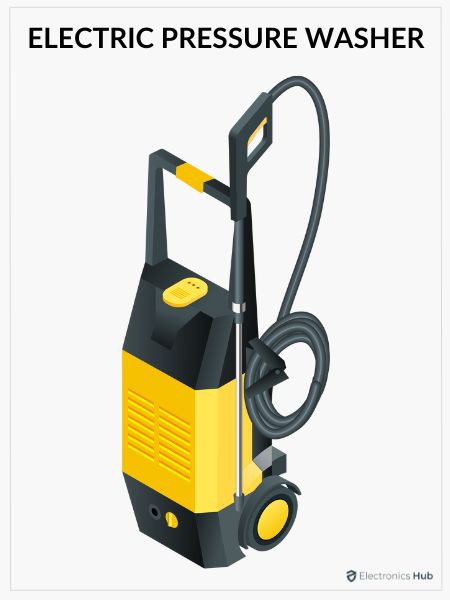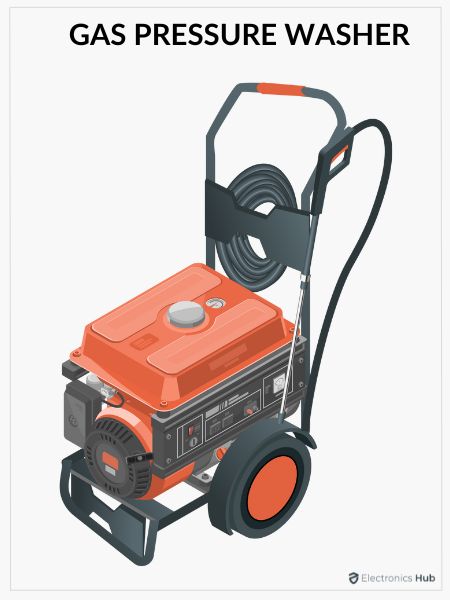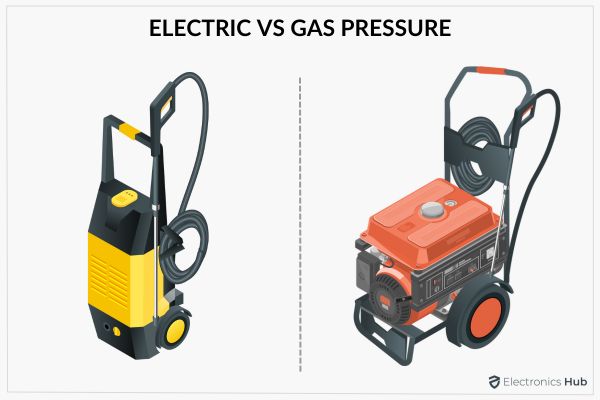When it comes to cleaning tasks (be it big or small), a pressure washer is an indispensable option. It is a popular and right choice for many reasons like convenient, portable, and many others.
But the main question relies on – whether you should go for an electric pressure washer or a gas pressure washer.
This dilemma is pretty common among most of the consumers while making the purchase. So, we have come up with a detail analysis that showcases the differences between these models.
Have a clear run through the information to know which option is the right choice for your requirements.
But before going into the comparison, lets a take a quick look into the models first.
Outline
ToggleOverview of Electric Pressure Washer
Electric Washers are ideal for washing common household items like chairs, cars, barbeques, etc. They have a pressure rating of around 1500-2000 PSI, and they work quite silently without contributing to any emissions. Moreover, the maintenance required is minimal.
The issue with such washers is that they constantly electricity and plugged in. Also, the build quality is not the best, and most times, it comes with a cheap look. This machine cannot be used in places without electricity, making it less versatile. The main drawback of electric pressure washers is that they cannot handle high pressure tasks.
Benefits of Electric Pressure Washer
- They are light, portable, and easy to use.
- These models can be used in enclosed spaces without fear of carbon monoxide poisoning.
- They are less expensive than gas models, and they produce no exhaust gases.
- Electric pressure washers have less maintenance as you don’t need to purchase gasoline.
- They don’t generate noise while operating.
Drawbacks of Electric Pressure Washer
- As they have a smaller pressure range than a gasoline pressure washer, electric pressure washers are better for light jobs such as cleaning decks and cars. However, it takes longer to clean harder surfaces with an electrical pressure washer.
- The power cord limits mean that you cannot use an electric pressure washer beyond the limit of what your cord can carry. You can move the power source to cover a larger area or use an extension cable.
Overview of Gas Pressure Washer
Gas pressure washer are much more powerful when you compare it with an electric washer. As a result, they are used for tasks like cleaning footpaths and parking spaces. They have a better build quality and are made of durable aluminium and steel. Also, portability is not an issue as they do not have to be plugged into a socket all the time. However, these are quite heavy and will wear you out.
Benefits of Gas Pressure Washer
- They are fairly expensive, with some models priced upwards of $500. Also, they are somewhat noisy and require regular maintenance work.
- The PSI of gas machines is higher than that of electric pressure washers. This gives them more cleaning power and makes them better suited for demanding jobs.
- Gas machines also have a higher GPM which makes them faster in cleaning large areas.
Drawbacks of Gas Pressure Washer
- Gas machines have two main disadvantages: they are more expensive upfront and require frequent maintenance such as changing the oil, spark plug or cleaning the filter.
- Electric models are louder and heavier than gas-powered ones. These models should not be used on fragile surfaces as they can cause damage due to their high pressure.
Comparison Between Electric and Gas Pressure Washer
| Variable | Gas | Electric |
| Water pressure | 2000 PSI to 4900 PSI | 1000 PSI to 2000 PSI |
| Cleaning unit | 5280 to 16000 | 1000 to 3200 |
| Temperature | Cold | Cold |
| GPM | 1 – 4 | 1 – 1.6 |
| Price | 299 | 109 |
Let’s look at the detail description of each factor below for more clear understanding.
 1. Water Pressure
1. Water Pressure
The power of a pressure washer is expressed in pounds per square inch. The PSI of powerful pressure washers is higher. An electric pressure washer can produce 800-1,800 PSI. This pressure washer is ideal for outdoor cleaning. This pressure washer can be used to clean your windows. To ensure that your pressure washer works efficiently, it should have a nozzle that is adjustable to adjust the spray angle.
Gas pressure washers come with a stronger option. Their PSI rating is usually between 2,000 and 2,800 PSI. Some of these pressure washers are capable of producing up to 3,000 PSI. Make sure you check the spray angle before you press the trigger on any pressure washer. A gas-powered pressure washer is best for heavy-duty jobs.
2. Water Flow Rating
The gas-powered units have the advantage in water flow rating. The electric pressure washer is more difficult to press than the gas pressure washers and may deliver less. Although the gas-powered pressure washer can deliver 1.5 GPM, there are many units that produce the same. Gas pressure washers are capable of producing 2.5 GPM and more in most cases. It also has a powerful engine, functional and heavy-duty pumps, and brass parts that can handle large amounts of water.
3. Cleaning Unit Rate
A cleaning unit typically displays the maximum pressure that a pressure washer can use. Higher cleaning capacity means the pressure washer is capable of providing superior cleaning. The cleaning range should be 2,000 or higher for household use. The cleaning power of electric models is between 2,000 and 8,000. Gas-powered models typically have cleaning range of 8,000 – 35,000. As the name implies, commercial-grade models usually come with higher cleaning units rating.
4. Water Exertion
The water exertion rate can be expressed in gallons per hour. For household use, a pressure washer producing between one and four gallons per minute is suitable. A pressure washer with a higher water exertion is best for cleaning large areas that have a lot dirt.
5. Durability
there is a significant difference in durability between the two types. Gas pressure washers are more durable than metal pressure washers because the components and pumps can be replaced and maintained easily. It is much more difficult for electric pressure washers to be repaired. They don’t last as well.
6. Portability
Portability is a key factor when cleaning large areas that require manoeuvring around a lot. Although the electric models are portable, their power cords will limit their mobility. They can also be easily moved from one location to the next because they are lightweight. They usually depend on power outlets nearby.
You can transport the pressure washer easily from one place to another if there are multiple power outlets. To clean walkways or other areas, long extension cords with electric models can be helpful. The extension cord is required to power the pressure washer outdoors and it has to be long and thick enough.
The electric models are lightweight and can be transported easily from one place to the next. Gas-powered models can be difficult to transport because they are usually heavy. The latest pressure washers are lighter and can be easily transported from one place to the next.
7. Price
The price of electric pressure washers is generally lower than the cost of gas-powered pressure washers. A high-quality pressure washer can be purchased for $150. Gas-powered pressure washers are more expensive. Gas-powered pressure washers cost between $200 and $2000. Pressure washers that are commercial-grade usually cost more. There are many brands to choose from, with different warranties and transport conditions.
Electric or Gas – Which One to Go For?
Individuals who have a gas-powered models admit that they only use it occasionally. The pressure washer is not used often unless pressure washer is needed to clean the walkways or driveways. Sometimes, the gas-powered models can also be used to clean the cars. The electric models are often talked about by people who have them. They are used for cleaning cars and brash out leaves on the driveways and pathways.
The maintenance costs and frequency of working with these appliances them depend on different factors. If were asked to make a choice, we would choose an electric pressure washer over a gas pressure washer one. Consider how frequently you intend to use them. The electric models are portable, but they do the job.
Conclusion
Between the electric pressure washer and gas pressure washer, there is no one right answer. Both have their best uses. It is up to you to decide what you use it for and how frequently you plan on using it.
An electric power washer is sufficient for smaller jobs. If you require it for more complex, in-depth tasks, an electric power washer is sufficient.
We hope you have been able to see the many unique features and uses of electric and gas pressure washers. We hope that you will be able to make an informed decision about which one is best for you. We are happy to answer any questions that you might have via the comments. We are happy to assist you as soon as we can!
Related Posts:
- Pressure Washer Nozzle Chart | Chart of Different…
- WHOLESUN 3000PSI Electric Pressure Washer
- Why Do You Need Pressure Washer Fittings – Explained Here!
- Manometer vs Pressure Gauge - What are the Key Difference?
- Air Pump vs Air Compressor | Working, Applications,…
- 9 Best Electric Pressure Washer for the Money Reviews




